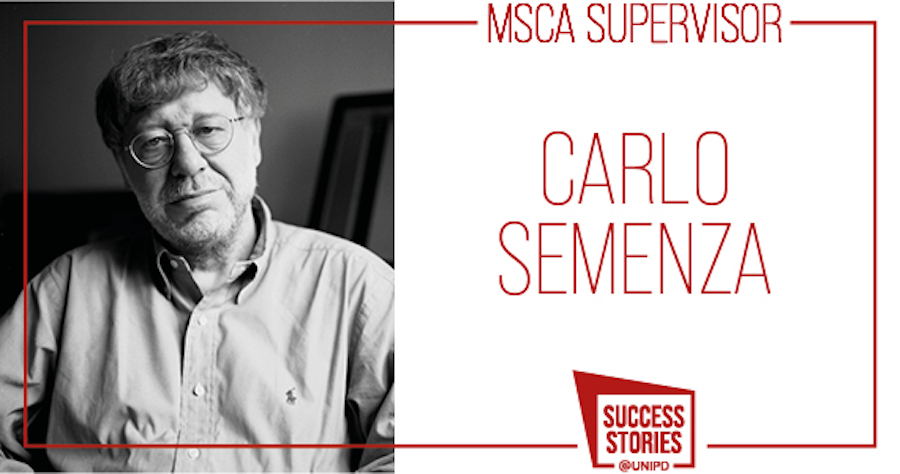
MSCA Supervisor: Carlo Semenza
What does it take to prepare a solid research grant application? We have asked for some tips to Professor Carlo Semenza, full professor of Neuroscience at the University of Padova.
His career reflects the interdisciplinary character of his scientific interests, which are mainly centered on the biology of cognitive functions.

Carlo Semenza is full professor of Psychobiology at the University of Padova, where hegraduated in Medicine (1974) and later specialized in Psychiatry (1978). He performed his teaching and research both in Italy and abroad, visiting Universities and research centres in the U.S., in Canada, Australia and Europe. With his earlier supervisor, G. Denes, he founded the European Workshop on Cognitive Neuropsychology, a very successful yearly meeting, which is still ongoing.
Carlo Semenza supports MSCA-Ifs and acts a supervisor for younger researchers. Keep on reading for some useful tips on how to score a successful research grant application!
Prof. Carlo Semenza, you’ve spent several years abroad and at the University of Trieste before landing at the University of Padova. Could you tell us something about your career?
I actually graduated in Medicine from the University of Padova (1974), where I also specialized in Psychiatry (1978). In 1977-78 I spent a year at the Aphasia Research Unit at the Boston V.A. Hospital. I started my teaching in Psychology in 1979 at the University of Padova. I became an associate professor in 1986. In 1995, I moved to the University of Trieste as a full professor of neuropsychology. There, I served a term as Head of the Department of Psychology and as the first Director of the Clinical Psychology School. I came back to Padova in 2008, to the Department of Neurosciences, teaching in the Literature and Philosophy faculty. I transitioned fully to the Medical School Faculty in 2012.
I have visited and taught courses in Boston, Melbourne, Victoria (Canada), Madrid, S. Sebastian (Spain), and Athens, and have given seminars and talks worldwide. In 1983, I founded (with my earlier supervisor, G. Denes) the European Workshop on Cognitive Neuropsychology, a very successful yearly meeting, which is still ongoing.
As you can see, my career reflects the interdisciplinary character of my scientific interests, centered on the biology of cognitive functions. The methods I use for my research almost always start from clinical observations. These observations are, however, made possible by using notions taken from cognitive psychology, formal linguistics, and philosophy. I also try to understand how the brain makes the processes observed in psychoanalysis possible. I later used other methods, like neuroimaging (MRI, MEG) and electrophysiological techniques (ERP, TMS). I have also done a few studies in awake brain surgery. I have published over 300 papers, mainly in international journals. My studies are cited not only by neuroscientists, but also by linguists, philosophers, and psychoanalysts.
What are the main research projects you’ve worked on and what research projects are you currently carrying forward?
I have received funding from NATO, the EU, the Ministry of Education, and the Ministry of Health. Most of my past and present projects have a foundational language component. However, the most important ones, involving the most prominent funding mechanisms, were part of larger investigations concerning attention (I study how language and math can modulate attention to space) and math (I study the relation its functions have with language). I started and was part of several European networks, each involving about half a dozen laboratories in different European countries. I could thus hire the best young people I could possibly hope for. Most of them, Italian or from other countries, are now professors all over Europe and the US. Local projects funded by the University of Padova handsomely contributed in supporting my more recent research.
My current projects concern lexical processes, in particular proper name retrieval, a theme I have continuously explored since the late 1980s, when I published a paper in Nature supporting philosophical theories on the basis of neuropsychological observations. I work on compound nouns, trying to understand how the brain puts together words to form other words. I also try to understand how attention is driven by particular linguistic structures. A relatively new theme is that of financial abilities. We recently demonstrated how older people rely on limbic structures (those sustaining emotions) for financial choices. The latest toy I am using, with the crucial help of my Marie Curie fellow, Elena Salillas, is magnetic electroencephalography (MEG), which we are using to find out what happens when our brain performs single digit calculation. I'll also use MEG with the latest Marie Curie winner, Mari Ranzini, on how math can modulate motor functions.
You’ve led several research projects. What tips would you share with a researcher who is thinking of applying for an important research grant?
One obvious strategy is to start with clear, theoretically grounded questions. Do not overdo. Have some pilot work that you can mention. Keep in mind that the reviewers may know only a little bit about the type of stuff you do. After all, at this stage, it’s best if the main expert on your topic is you! You have to explain why the question you are addressing is interesting, and that you know how to answer it and have the means to do so. You’d better be very detailed in describing your initial experiments, because many others will emerge from your investigation. Pay lip-service to how important the notions you want to uncover may be to society, or how they can be applied in other fields, but do not exaggerate.
One crucial point is to take all requests and instructions appearing in the application form extremely seriously. Follow the instructions literally – any negligence will be played against you.
Two final tips for a Marie Curie: 1) Go into detail in describing your supervisor’s experience, possibly reporting the names of their most successful pupils and their present positions. If your supervisor is young, stress the ability to attract grants and fellowships for starting researchers, and mention the number of PhD students supervised. Contact the potential supervisor as soon as possible about the feasibility of a project. There may be many obstacles in the way. I hope my successors will have an easier time of it than I had. For applicants in the Department of Neurosciences, the Padova Neuroscience Center, recently founded by Prof Maurizio Corbetta, with my contribution, may help. 2) You are likely to know some technique, statistical method, or experimental design or possess some solid theoretical knowledge that is not yet familiar to the host institution – make sure to emphasize this in the project.
How important is your research for rehabilitation programmes?
Rehabilitation has been the focus of some of my funded projects. For instance, I had a specific project on the rehabilitation of math disorders financed by the Ministry of Health. An earlier EU-supported project led to a few papers reporting rehabilitation findings. However, results of rehabilitation studies can also be used for theoretical purposes and they can answer theoretical questions. Success with a given technique rather than another may show you that a theory about the nature of a given task is correct. Now my group is preparing computerized packages for remote rehabilitation. That is the future, perhaps…


